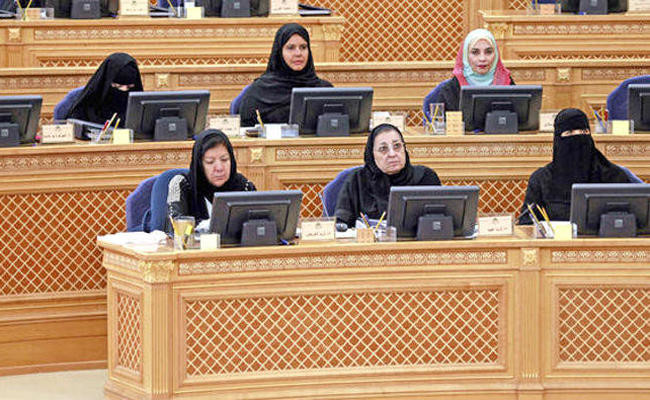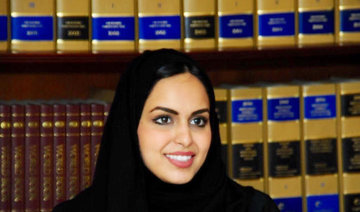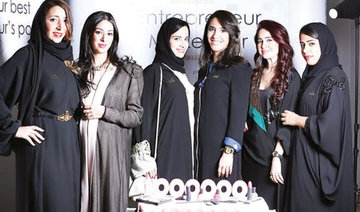JEDDAH: It was a year to remember for many Saudis. For the first time in history, 30 Saudi women took their seats as members of the Shoura Council in February 2013, and were sworn in before the presence of the late King Abdullah bin Abdul Aziz.
Five years on, female Shoura Council members are still playing a major role in different issues concerning social development in the Kingdom.
Saudi women in the Shoura Council have come a long way. Their achievements have been recorded in history and their powerful voices continue to be heard.
None of the women needs introduction, with each having a long history of achievements even before their appointment.
Lina Al-Maeena spent more than 15 years leading a fight for women’s sports in Saudi Arabia. She founded Jeddah United in 2003, Saudi Arabia’s first private female basketball club.
Despite facing a backlash, she pushed for acceptance in the conservative community and has finally won recognition with the realization that it is important for women to participate in sports activities.
In compliance with Vision 2030 — which includes development programs preparing the Kingdom for a promising future — the Saudi government has committed to elevating the status of sports in the Kingdom, a boost to promoting physical fitness for both men and women alike.
But promoting sports activities for Saudi women is not Al-Maeena’s only goal.
“It’s not simply about the empowerment of women in sports from an athletic point of view, I’m also looking at it from an economic perspective,” she said.
“Sports as a business is in line with the goal of Vision 2030 — to increase the number of women in the workforce from 22 percent to 30 percent. It’s not just the health, social benefits and development aspects, I’m very big on economics too.”
“When it comes to women's empowerment, I like to look at a gender as a whole, not just women,” adds Al-Maeena. “I advocate under the Shoura Council dome, for many environmental issues. Saudi Arabia is a member of the G-20 and we have a global responsibility to become supporters of a green lifestyle to sustain effective development.”
“It’s a golden age for Saudis and as women, we’ve come a long way. Every other day you see things happening and it’s a great celebration of achievements. We’re living this era of historical change, both pre- and post-Vision 2030 and we’re making up for lost time,” said Al-Maeena.
Fawzia Abalkhail, a professor of Information Technology and Education at Princess Noura hUniversity (PNU) who has a doctorate in the philosophy of education, is one of 20 new female Shoura members appointed in 2016.
She believes that every member of the Shoura Council has a national responsibility entrusted to them by the Custodian of the Two Holy Mosques by virtue of his appointment.
“As a female Shoura Council member, I support development issues in the education sector, health sector, public services and social affairs … [and in doing so] to support many fellow members in women empowerment issues,” said Abalkhail, appointed in 2013-2014 as the undersecretary of PNU for Graduate Studies and Scientific Research and vice president of PNU for health affairs.
“We focus on finding means of support and setting the standards that will increase women’s contributions in matters of social development, provide greater chances for assuming higher governmental positions as well as managerial roles in the private sector,” she said.
Abalkhail is of the opinion that Saudi women must gain skills in various fields in order to contribute. She believes a woman plays a pivotal role in society to ensure its stability and structural health, a role that is no less than a man’s.
“I am keen on laying the foundations and the right means in which all women can acquire the knowledge they need to enrich their social contributions,” said Abalkhail, who is also a member of the Saudi Society for Education and Psychological Sciences.
“Women are required to be their own self-development researchers. I am very interested in making sure education is improved, facilitate it and widen the scope beyond academic constraints. In doing so, a wider range of knowledge exchange will be provided between all those who seek it to build healthier social practices.”
Education has played a major role in empowering women in Saudi Arabia for many years.
Dr. Alia Aldahlawi, an associate professor at the Department of Biology-Organisms in the Faculty of Sciences at King Abdul Aziz University, agreed that education was key to ensuring women qualified for senior positions.
“The Kingdom’s scholarship programs have sent countless of women and men alike to get an equally challenging education and thus return to hold positions they’re most qualified for. Society must place their trust, reverse their mindsets to empower our women,” she said. “It’s also important that women realize that it is essential they work harder and prove themselves to the naysayers.”
“To my knowledge, there are approximately 1,000 Saudi women professors with different scientific occupations in many universities of the Kingdom,” Aldahlawi said.
“They’ve held high administrative positions with years of experience. We see female diplomats employed in the Saudi Foreign Ministry, researchers and inventors in the health sector, economic and business experts and so much more.
“They are pioneers of their fields and their abilities are an asset to the Kingdom that must be utilized.”
Saudi women’s voices in Shoura Council continue to be heard
Saudi women’s voices in Shoura Council continue to be heard

Saudi minister holds talks with Chinese, EU officials on climate, global issues

RIYADH: Saudi Arabia's Minister of State for Foreign Affairs and Climate Envoy Adel Al-Jubeir received China's Special Envoy for Climate Change Liu Zhenmin in Riyadh on Sunday.
During the meeting, they discussed strengthening cooperation in climate action and environmental conservation, along with other topics of mutual interest.
Both officials also reviewed the Kingdom’s ongoing initiatives and achievements in this field, the Saudi Press Agency reported.
In a separate meeting, Al-Jubeir received the deputy secretary-general for political affairs at the European External Action Service, Olof Skoog, and his accompanying delegation.
The meeting reviewed international developments and the efforts being made to address them, in addition to discussing topics of mutual interest.
Sheikh Saleh bin Humaid to deliver Arafah sermon during Hajj 2025

- The day of Arafah (the 9th of Dhul Hijjah) is widely considered the pinnacle of Hajj, marking the most important day for pilgrims
- The sermon is delivered from Masjid Al-Nimra on Mount Arafat before Dhuhr and Asr prayers are performed together on Dhul Hijjah 9
RIYADH: Sheikh Saleh bin Humaid will deliver the Arafah sermon during this year’s Hajj, the Presidency of Religious Affairs announced on Sunday.
The day of Arafah (the 9th of Dhul Hijjah) is widely considered the pinnacle of Hajj, marking the most important day for pilgrims. Muslims around the world who are not performing the pilgrimage mark the day by fasting and engaging in worship.
The sermon is delivered from Masjid Al-Nimra on Mount Arafat before Dhuhr and Asr prayers are performed together on Dhul Hijjah 9.
Head of Religious Affairs of the Grand Mosque and the Prophet’s Mosque Sheikh Abdulrahman Al-Sudais thanked King Salman and Crown Prince Mohammed bin Salman for the appointment.
The appointment underscores the Kingdom’s global religious leadership, reflects its continued support for religious institutions, and exemplifies the leadership’s care for the two holy mosques, the presidency said.
Saudi deputy FM receives EU official in Riyadh

- A meeting was also held as part of the third round of political consultations between Saudi Arabia and the EEAS
RIYADH: Saudi Deputy Minister of Foreign Affairs Waleed Elkhereiji received Olof Skoog, deputy secretary-general for political affairs at the European External Action Service, and his accompanying delegation, in Riyadh on Sunday.
During the meeting, they discussed bilateral relations between the Kingdom and the EU and other topics of common interest, the Foreign Ministry wrote in a post on X.
A meeting was also held as part of the third round of political consultations between the Kingdom and the EEAS. Senior officials from both sides participated in the session, chaired by Raed bin Khalid Qarmli, director-general of the general directorate of policy planning at the Saudi Foreign Ministry, with Skoog representing the European side.
Pakistani ambassador to Saudi Arabia meets with CEO of Diriyah Gate Development Authority

- The meeting focused on strengthening Saudi-Pakistani ties in the field of heritage and culture
RIYADH: Ahmad Farooq, Pakistan’s ambassador to Saudi Arabia, met with Jerry Inzerillo, CEO of Diriyah Gate Development Authority in Riyadh.
The meeting focused on strengthening Saudi-Pakistani ties in the field of heritage and culture, the Pakistani Embassy wrote in a post on X on Sunday.
The ambassador presented Inzerillo with a painting from his own Diriyah-themed series, created to celebrate the Kingdom’s history and heritage.
He also presented him with a made-in-Pakistan FIFA-standard football “symbolizing Pakistan’s craftsmanship and the mutual spirit of friendship.”
Saudi reserve engages pilgrims on biodiversity

- Pilgrims were welcomed at Al-Shuqaiq in the Jouf region, where more than 4,000 gifts reflecting the reserve’s history and conservation efforts were distributed
RIYADH: Hajj pilgrims arriving in the Kingdom by land were introduced to projects and initiatives of the King Salman bin Abdulaziz Royal Reserve Development Authority.
The initiative aims to enhance biodiversity, restore vegetation and breed endangered species to create a more sustainable natural environment.
The authority also distributed educational brochures to raise awareness about environmental preservation, the Saudi Press Agency reported.
Pilgrims were welcomed at Al-Shuqaiq in the Jouf region, where more than 4,000 gifts reflecting the reserve’s history and conservation efforts were distributed.
Visitors were informed about the reserve’s environmental heritage, biodiversity, and commitment to sustainable ecological stewardship, the SPA added.
The authority works to preserve biodiversity by protecting habitats and creating safe environments for wildlife and plants to thrive.
Its achievements include planting more than 2.4 million trees, scattering four tonnes of native seeds and rehabilitating 250,000 hectares of degraded land.
The reserve hosts more than 290 documented bird species — about 58 percent of those recorded in the Kingdom — and includes five internationally recognized important bird areas.
Covering 130,700 sq. kilometers, the King Salman Reserve is the largest natural terrestrial reserve in the Middle East, spanning four administrative regions: Jouf, Hail, Northern Borders, and Tabuk.





















